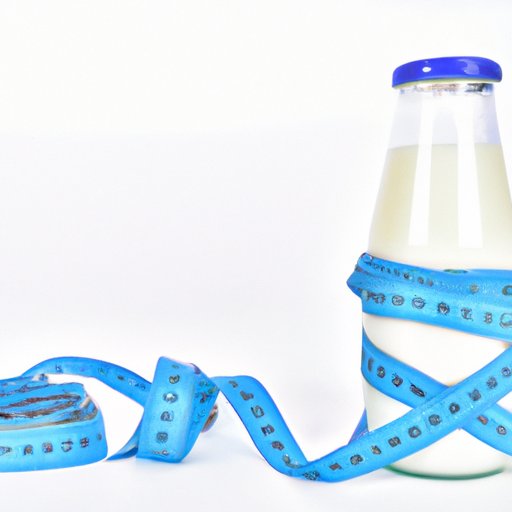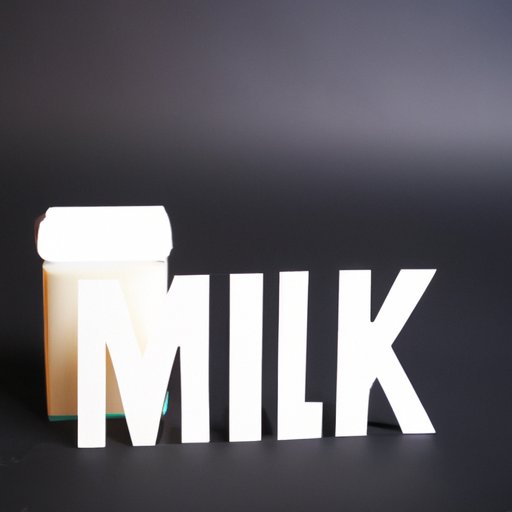
Introduction
Are you one of the millions of people who grew up with the idea that milk is an essential part of a healthy diet? While milk does have its benefits – providing essential vitamins and minerals, such as calcium and vitamin D – it may not be the best choice for everyone, particularly those looking to lose weight or follow a specific diet plan. In this article, we explore the pros and cons of milk consumption when it comes to dieting, separating fact from fiction and offering practical tips for those looking to modify their milk intake.
Why Milk Can be Detrimental to Your Diet and What to Do About It
One of the primary ways milk can negatively impact a diet is due to its high calorie and sugar content. A single cup of whole milk contains approximately 150 calories and 12 grams of sugar, while flavored milks can contain even more. Consuming too many calories and excess sugar can derail weight loss efforts and contribute to other health issues, such as type 2 diabetes and heart disease.
In addition to its calorie and sugar content, milk may also cause inflammation and digestive issues in some individuals, particularly those who are lactose intolerant or have a sensitivity to dairy. If you are experiencing symptoms such as bloating, gas, or stomach pain after drinking milk, try switching to a lactose-free option or opting for dairy-free alternatives such as almond milk, soy milk, or coconut milk.
The Truth About Milk and Its Effects on Your Fitness Goals
While milk does contain important nutrients such as protein and calcium that can support a fitness routine, it may not be the best choice for everyone when it comes to achieving specific fitness goals. For those looking to build muscle mass, milk can be a helpful addition due to its high protein content. However, for those looking to lose weight or reduce body fat, milk may not be the best choice due to its calorie and sugar content.
If you are trying to achieve specific fitness goals, it is important to consider your overall diet plan to ensure it aligns with those goals. For example, bodybuilders may benefit from consuming more protein, whereas those looking to lose weight may need to reduce their overall calorie intake, including calories from milk.
Dairy Dilemmas: Is Milk Really as Healthy as We Think?
Despite the long-held belief that milk is necessary for a healthy diet, some experts are starting to question whether or not this claim is valid. While milk does contain important nutrients such as calcium, potassium, and vitamin D, it is not the only source of these nutrients. Many plant-based foods, such as leafy greens, almonds, and tofu, also contain calcium and other important nutrients often found in milk.
Furthermore, studies have found that high levels of dairy consumption may actually increase the risk of certain health issues, such as prostate cancer and ovarian cancer. While the evidence is still limited and more research is needed, it is important to consider the potential risks associated with relying too heavily on dairy in your diet plan.
Milk and Weight Loss: What You Need to Know
The connection between milk and weight loss is a contentious issue in the health and wellness community. On the one hand, milk does contain important nutrients that can support a healthy diet, such as protein and vitamin D. On the other hand, milk is calorie-dense and may contribute to weight gain if consumed in excess.
If you are looking to lose weight, it is important to consider your overall calorie intake and find ways to reduce excess calories, including those from milk. This may involve swapping higher-calorie milk options for lower-calorie alternatives, such as skim or 1% milk, or opting for dairy-free alternatives altogether.

The Milk Myth: Separating Fact from Fiction
There are many myths and misconceptions surrounding milk and its effects on the body. One commonly held myth is that milk can cause acne. While there is some evidence to suggest that there may be a link between dairy consumption and acne, the evidence is limited and more research is needed to establish a clear connection.
Another myth is that milk is necessary for strong bones and prevents osteoporosis. While milk does contain calcium, it is not the only source of this mineral, and studies have actually found that high levels of dairy consumption may not necessarily lead to stronger bones.
The Pros and Cons of Consuming Milk on a Diet and Health Plan
Ultimately, whether or not milk is beneficial for your diet and health plan will depend on a variety of factors, such as your age, activity level, and health status. For some individuals, milk may be an important source of essential nutrients that support overall health and wellness. For others, milk may contribute to excess calorie intake and other health issues such as inflammation and digestive problems.
It is important to consider both the potential pros and cons of consuming milk in your diet plan, and make informed decisions based on your individual needs and goals.
How to Modify Your Milk Intake for Successful Dieting
If you are looking to modify your milk intake to support a successful diet, there are a number of strategies you can employ. For example, you may opt for lower-fat options such as skim or 1% milk, or try substituting dairy-free alternatives such as soy milk or almond milk. You can also use milk in moderation, incorporating it into recipes or using it as an occasional treat rather than a daily staple.
Conclusion
While milk can provide essential nutrients and be a healthy addition to your diet plan, it is not necessarily the best choice for everyone. By understanding the potential pros and cons of consuming milk, and using practical strategies to modify your intake as needed, you can ensure that your diet supports your overall health and wellness goals.





